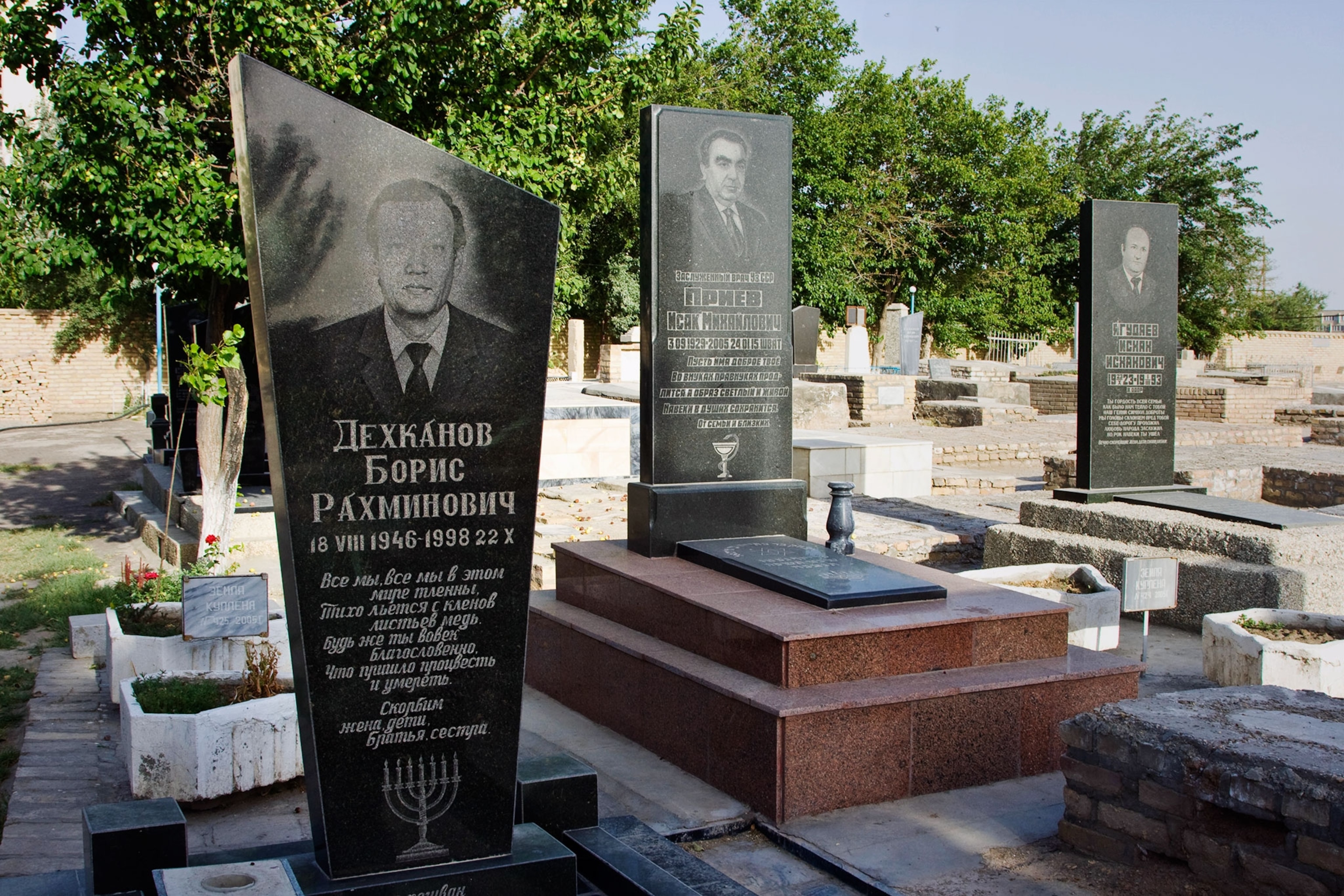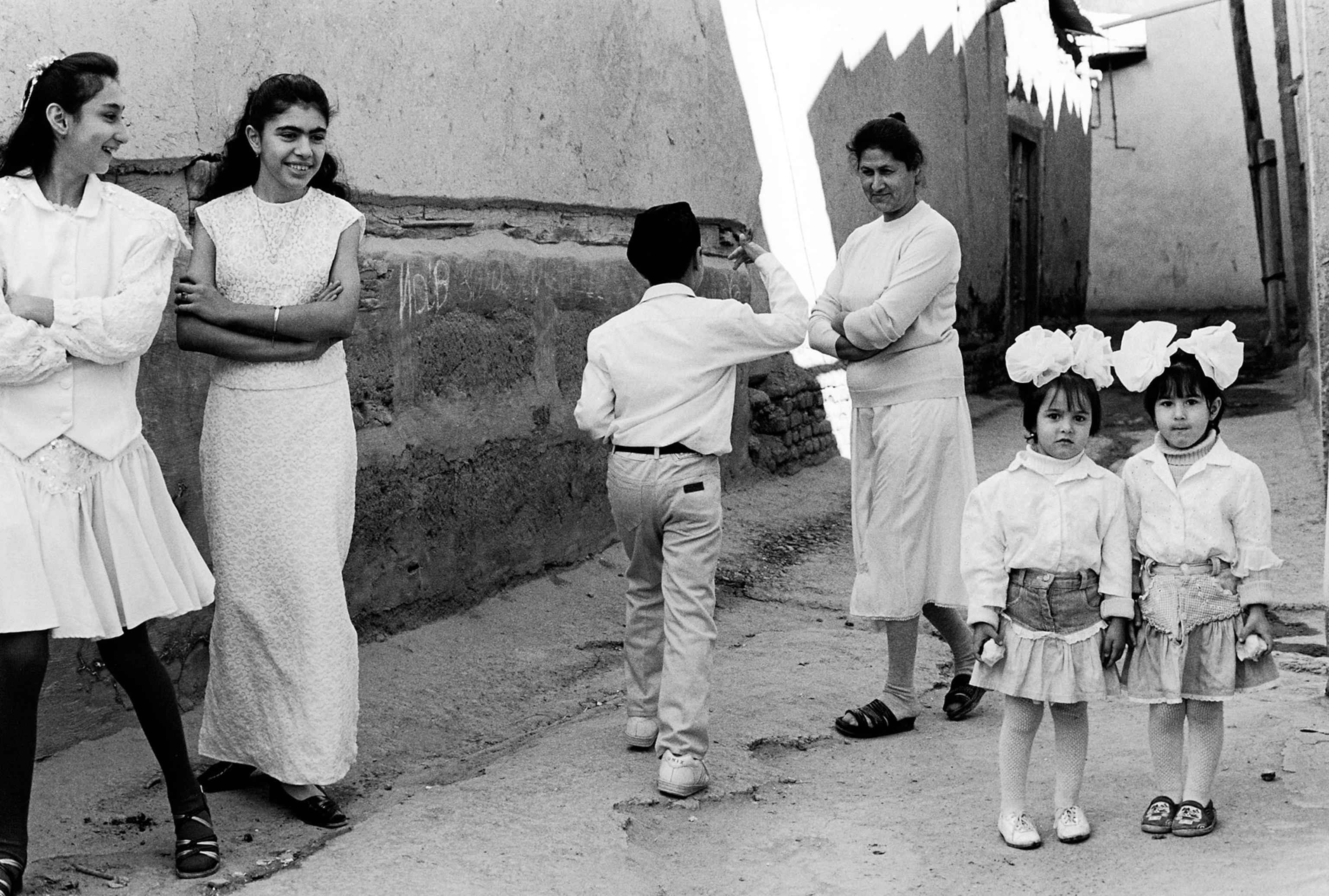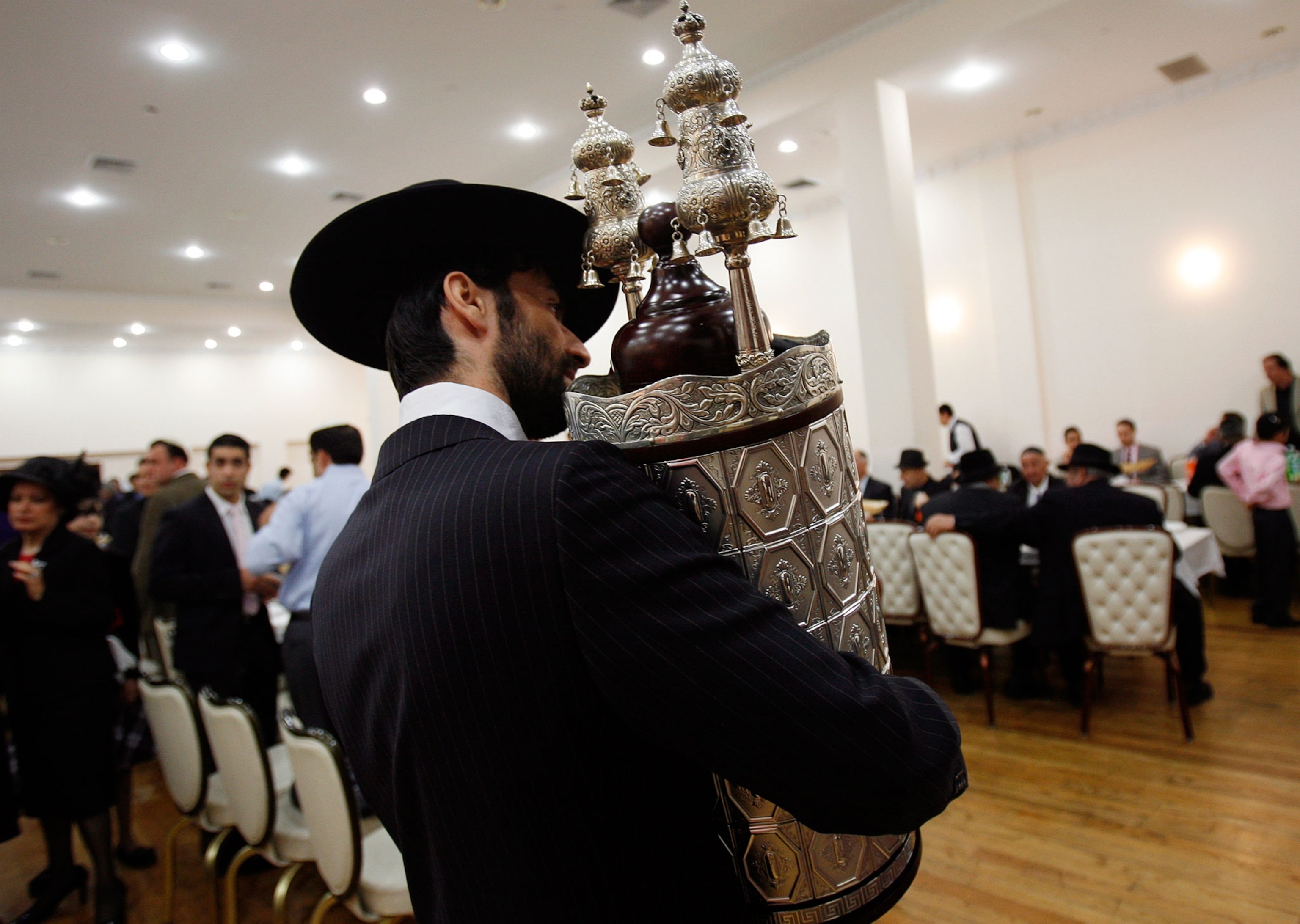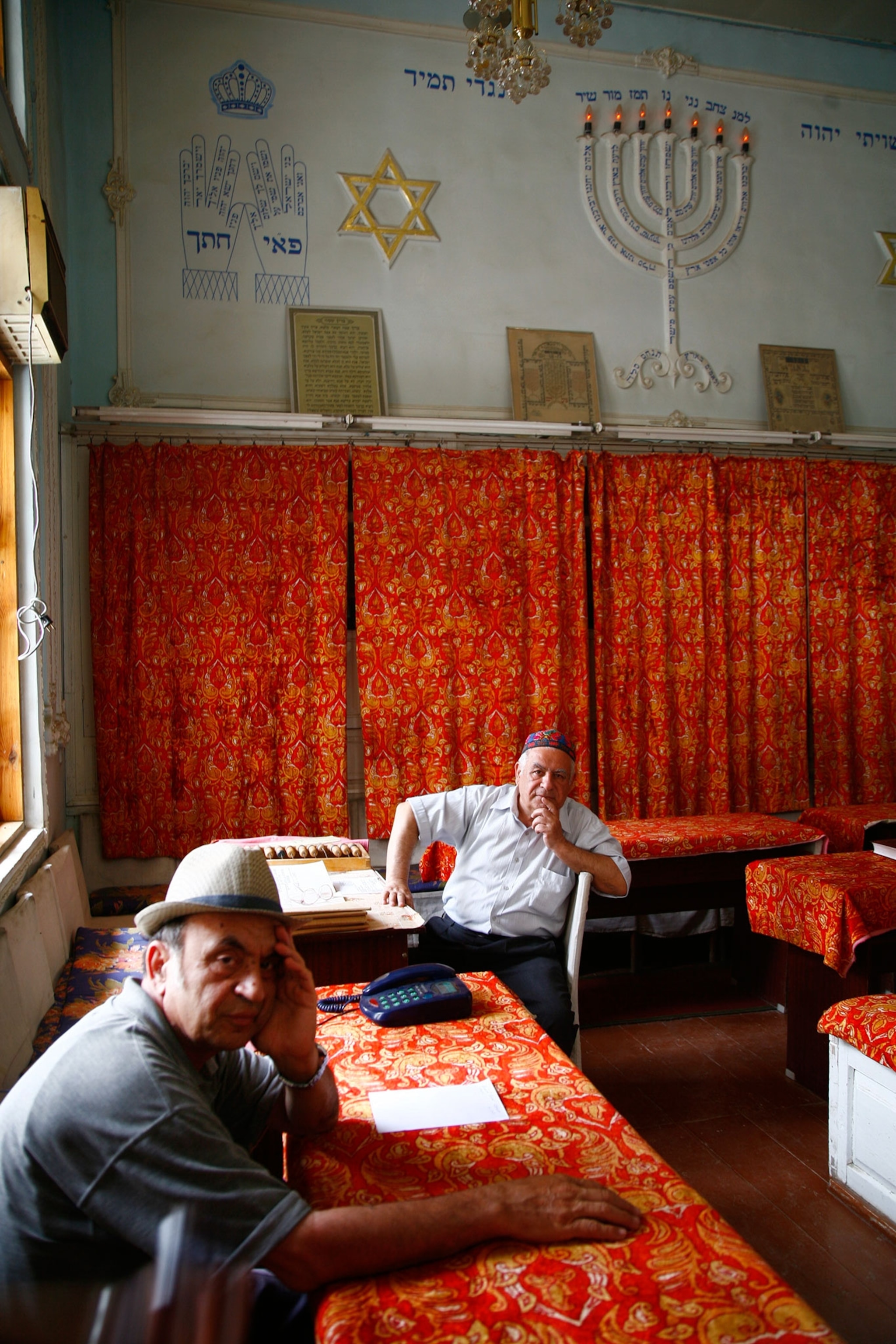
Bukhara Jews Thrive in New York but Are Almost Gone in Bukhara
In an ancient Uzbekistan city, there are often too few men to hold services, but the community still carefully tends its cemetery to uphold tradition.
BUKHARA, Uzbekistan — There are more than ten thousand graves here, sprawled over about 80 acres on the outskirts of the Silk Road-era old town. Most days, nobody visits. A covered mikveh pool—a ritual necessity by which Jews clean themselves after contact with the dead—is abandoned.
But the graves are immaculate.
Thousands have been renovated, most in the traditional post-Soviet style—laser-printed photorealistic depictions of the deceased, engraved in grayscale on black granite. In a country where the average wage is as low as $3 a day, the sight of these stones, which can cost hundreds or even thousands of dollars, is striking.
(Read About 'Crypto-Jews' Discovering Their Own Hidden Identities.)
Under the secularist Soviet Union, remembers Abraham Ishakov, cantor at the old town’s synagogue, carrying out the yushvo—mourning rituals central to the faith and culture of Bukharian Jews—was strongly discouraged. When his own father died, “we used to have to sneak into the synagogue and pray in secret.”
Now, caring for the dead in Bukhara is no less challenging an affair, albeit for different reasons. There is almost nobody left to mourn them.
Ishakov points out a plaque from 2000, commemorating the donors who paid for the most recent renovation. “Rafael Davidov. He moved to America. Jacob Rafaelkov. Off to Israel. Hasimov Sharimov. Israel. Isaac Abramov. New York. Soson Priyev. USA.”
Once, Central Asia was home to 45,000 Bukharian Jews: an ethno-religious group—speaking a dialect known as Judeo-Tajik—centered in this city. They worked as merchants and craftsmen, trading along the Silk Road.

When the Soviet Union collapsed, waves of Jews emigrated abroad—mostly to America and Israel—some for economic reasons, some because of fear of persecution, should an Islamist government should come to power in Uzbekistan.
(Read About the Disappearing Sea that Straddles Uzbekistan and Kazakhstan.)
Today, around 100 Jews are left in Bukhara, the community's heartland. In the New York City borough of Queens, alone, there are about 50,000.
Ishakov's niece and nephew are there. His children are divided between Israel and Australia. His parents, too, emigrated to Israel before they died.
“They're all telling me—why don't you go too?” Ishakov says. “It is possible to have a good life over there.” The diaspora in Queens, after all, is so vibrant that 108th Street is colloquially known as “Bukharian Broadway.”
Meanwhile, in Bukhara it is so difficult to find a minyan—the required quorum of ten men to hold services—that the community is often forced to go without.
But Ishakov wouldn’t think of leaving. “I visit Israel for one week every year,” he says. “But I am not in my comfort zone there. It is not my country. … We are called Bukharian for a reason.” He fears that Bukharian culture will become diluted abroad. “You hear about couples who have been married ten, fifteen years, who emigrate.” They lose their traditions, he says. Within months, they are divorced.
And besides, who would tend the graves?

Ancestors Venerated
A respected local historian, Ishakov is also one of the community's primary links between Bukharian Jews abroad and the grave sites of their ancestors. Organizations such as the Bukhara Fund—set up by a wealthy member of the diaspora—allow Jews who have emigrated to care for the graves from afar.
Ishakov estimates that between $50,000 and $60,000 comes in annually; he hires workers to restore or maintain the graves. For around $275, a Jew in Rego Park, Queens can hire a Bukharian to clean his grandmother's grave twice weekly for a year and send regular photos.
Sometimes Ishakov does the work himself.
“I remember this one woman who came from Israel,” he says. “She couldn't find her mother's grave here. She was hysterical.” It was in a part of the cemetery that had not been renovated. Ishakov points out the grave is now accessible.“I spent four months digging up that section.”
Now, he says, the woman can honor her ancestors properly—if she ever returns.
'I Did Not Make This Decision'
Ishakov takes me to the cemetery's edge, overlooking the old Jewish mashallah, or district. Here, one- and two-story family homes have been sold off to Uzbeks. Even the Akbar House, a late 19th-century mansion belonging to one of Bukhara's richest merchants, has been transformed into a boutique hotel, the grand foyer into a breakfast room. Its intricate carvings, wooden pillars, and Hebrew inscriptions now overlook French and Italian tourists drinking their morning coffee. Ishakov, too, points out the homes of his emigrated relatives, also sold and transformed into guesthouses.
We enter a small, dank office by the cemetery gates, where we meet Emmanuel Elnatov, the cemetery's director.
Elnatov too is alone in Bukhara, he says. His parents are in Israel; his wife—a Bukharian expat he met while visiting them—is in Israel too, along with his three children, whom he rarely sees. He longs to join them.

But Elnatov sees his work in Bukhara as a religious obligation. So much of Bukharian Jewish culture, after all, is centred on veneration of the dead. Now that yushvos are rare, proper care of Bukhara's gravesites is more important than ever. He cannot leave—even if he wants to.
“I did not make this decision,” he says. “It was made for me by God.”
Binding Obligations
Yet for many Bukharian Jews, this sense of obligation is a burden. For younger ones, opportunities to lead a full life are scarce. Only last year, Ishakov says, he approved a Bukharian boy's marriage to an Uzbek girl—breaking a once-unthinkable taboo against intermarriage—because of how few Jewish girls were left.
At the three-century-old synagogue, on a table cluttered with travel books about America—gifts, I'm told, from previous visitors—Daniel Sianov, son of the city's ailing rabbi, admits that only his desire to care for his father keeps him here.
We’re not defined by a land mass. We're defined by ideology.Shlomo Nisanov, Bukharian Jewish rabbi
He proudly shows me faded photographs of his father in younger days: performing yushvos and presiding over circumcisions: each photograph easily contains enough men for a minyan, men long since gone abroad.
“If it weren't for him, I would go to America,” Sianov says. There, he could join his brother in Flushing, Queens, and find skilled work as a technician. (He currently works at the synagogue, where he also sells CD anthologies of classic Uzbek and Bukharian music he compiles himself.)
“But my father will never leave this place,” he says, laughing darkly. Sianov tells me that even Ishakov himself once tried to persuade Rabbi Aron Sianov to take his son and emigrate. The younger Sianov sighs. “It'll never work.”
Still, Sianov and Ishakov express pride at the heritage that remains. They take out their synagogue's Torah—deerskin, he says, wrapped in a scarlet suzani, an embroidered Uzbek cloth—which tradition (if not Biblical historians) dates to the time of the Babylonian exile.

“We don't take that out for everyone,” Ishakov says, grinning. “Even when Madeleine Albright came—we didn't show it to her.” But he lets me take a photograph. After all, Bukhara’s heritage must be preserved, one way or another.
He opens a prayer-book—its cover, too, bound in a suzani —and begins to sing. His baruch atah adonai—a daily blessing—is intensely atonal: each syllable a melancholy wail.
When he sings, he smiles.
A Jewish Future?
What about Bukhara's children? I ask. What future is left for them?
Ishakov takes me next door, to the Jewish School. Founded immediately after Uzbekistan's independence in 1991, the school—run by the city council—opened its doors with a class of 114.
Today, the 30-odd children in the class I visit stand in unison—sporting the floral headdresses of the upcoming Nawruz, or Central Asian New Year—to greet me in chirpy Hebrew; the walls are plastered with colorful posters of the Hebrew alphabet.
But few pupils are Jewish, let alone Bukharian. They give their ethnicities proudly—Tartar, Uzbek, Russian, Ashkenazi. There is one Bukharian.
The school's headmistress, Rosa Abdeyeva, explains that, of the school's 384 pupils, just 30 are Bukharian. But the school's reputation as the most academically challenging in the city has made it a popular choice for Uzbek children, as well as those from other ethnic minority groups. All of them, she says, are required to learn Hebrew (though not Bukhari), though few will ever use it outside the classroom.

This makes Ishakov smile. “Other children learn the history, the culture, the religion of Jews,” he says. “You can see Uzbek children speaking Hebrew.”
Bukhara's Jews may be dwindling, but some cultural memory, at least, lives on.
Six thousand miles away, Shlomo Nisanov—a rabbi at a Bukharian synagogue in Flushing, where Rabbi Sianov's other son, Yakno, attends services—expresses shock at the stubbornness of Bukhara's last Jewish holdouts. Those who stay in Bukhara are, he says, “idealistic, not realistic. There's nothing for the young people; there's nothing for the old people, nothing.”
If it were up to him, everyone would leave Bukhara to resettle in Flushing. “We're not defined by a land mass,” he says, “We're defined by ideology.”
Still, even he admits, there's one thing in Bukhara no Bukharian Jew can let go of. “Our only connection is with our grave sites,” Nisanov says. “We want to make sure everything stays.”
Follow Tara Isabella Burton on Twitter.